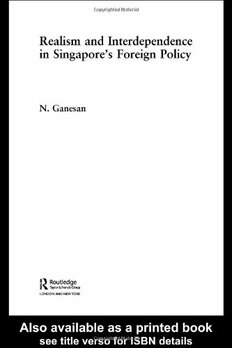
Realism and Dependence in Singapore's Foreign Policy (Politics in Asia Series) PDF
177 Pages·2005·1.128 MB·English
Most books are stored in the elastic cloud where traffic is expensive. For this reason, we have a limit on daily download.
Preview Realism and Dependence in Singapore's Foreign Policy (Politics in Asia Series)
Description:
Singapore's existence and success derive in part from its success in the domestic political arena and in part from the skilful management of a well-defined foreign policy with clearly identifiable goals and issues. A clear core of realist self-reliance is layered with the demands of a competitive trading state that requires a liberal international trading regime. Hence, both competitive and cooperative philosophies underpin Singapore's foreign policy. In Realism and Dependence in Singapore's Foreign Policy, Narayanan Ganesan charts the philosophical underpinnings of Singapore's foreign policy output and the institutions responsible for it and examines the importance of economic and defense diplomacy that are central to Singapore's foreign policy output. It gives particular attention to the two most important regional bilateral relationships-with Indonesia and Malaysia-and how relations with its adjacent neighbors have influenced Singapore's foreign policy. Combing first-hand research with excellent analysis, this volume provides a much needed report on the survival of a small state in the globalizing world. Realism and Dependence iis essential reading for academics in the field of Asian studies and Asian foreign policy, and will be of interest to scholars across a wide range of disciplines in the region and the world.
See more
The list of books you might like
Most books are stored in the elastic cloud where traffic is expensive. For this reason, we have a limit on daily download.
